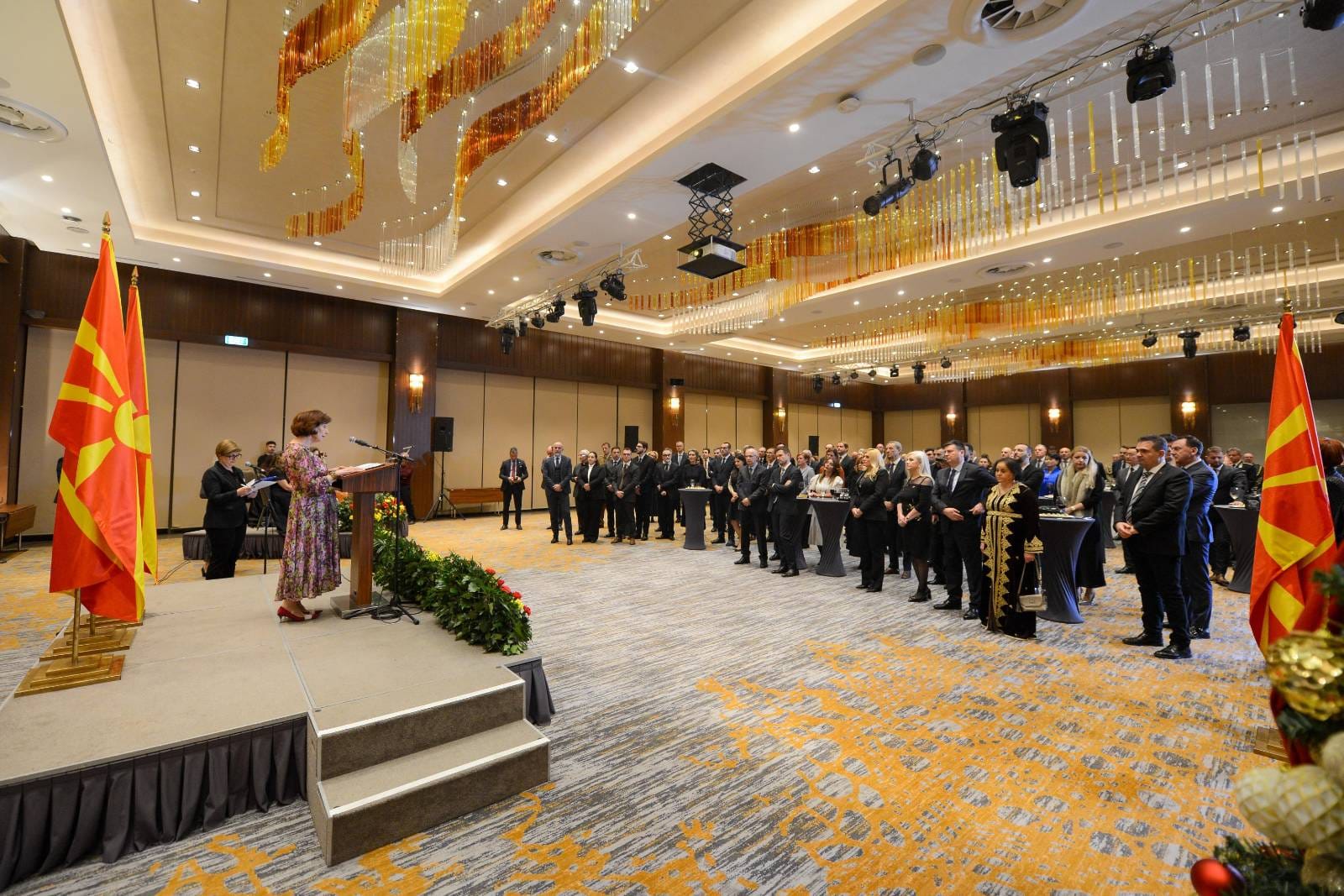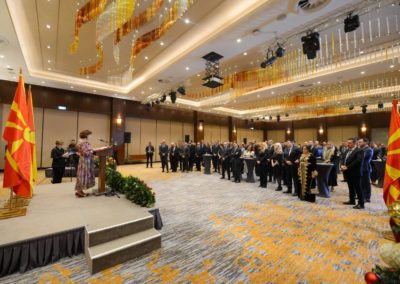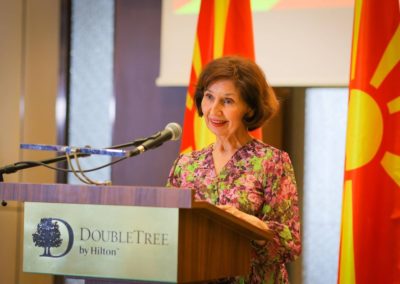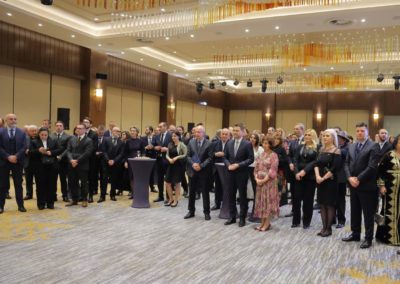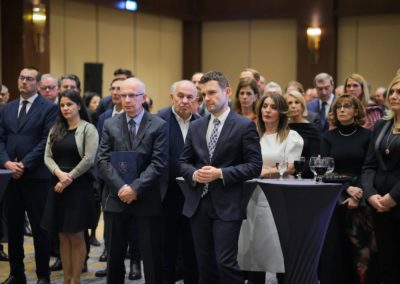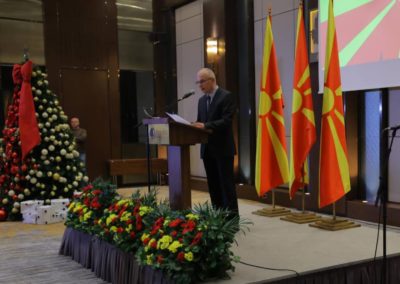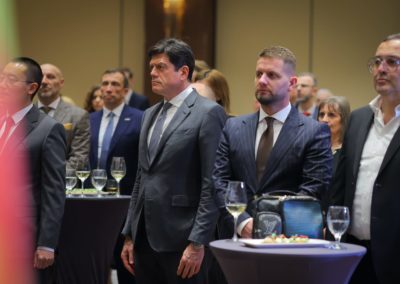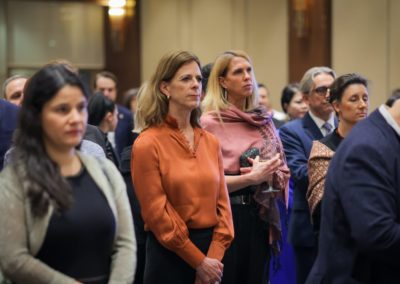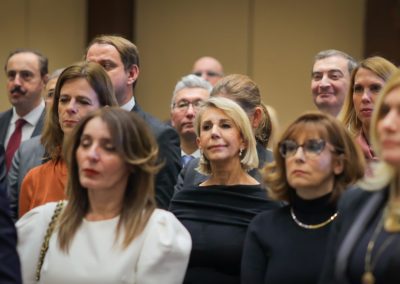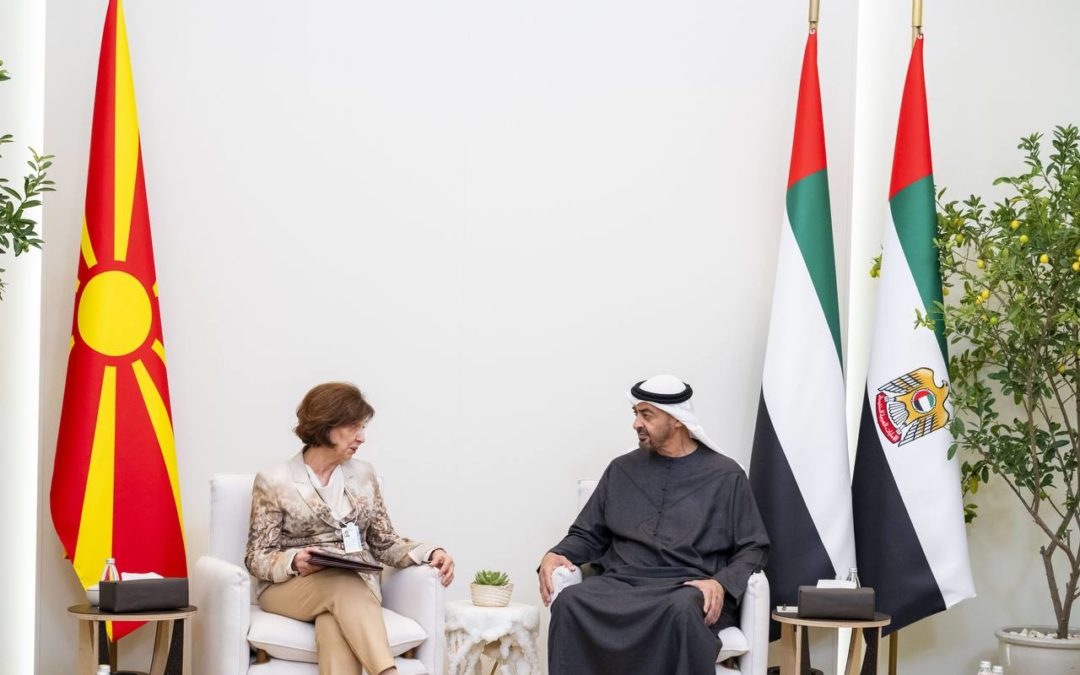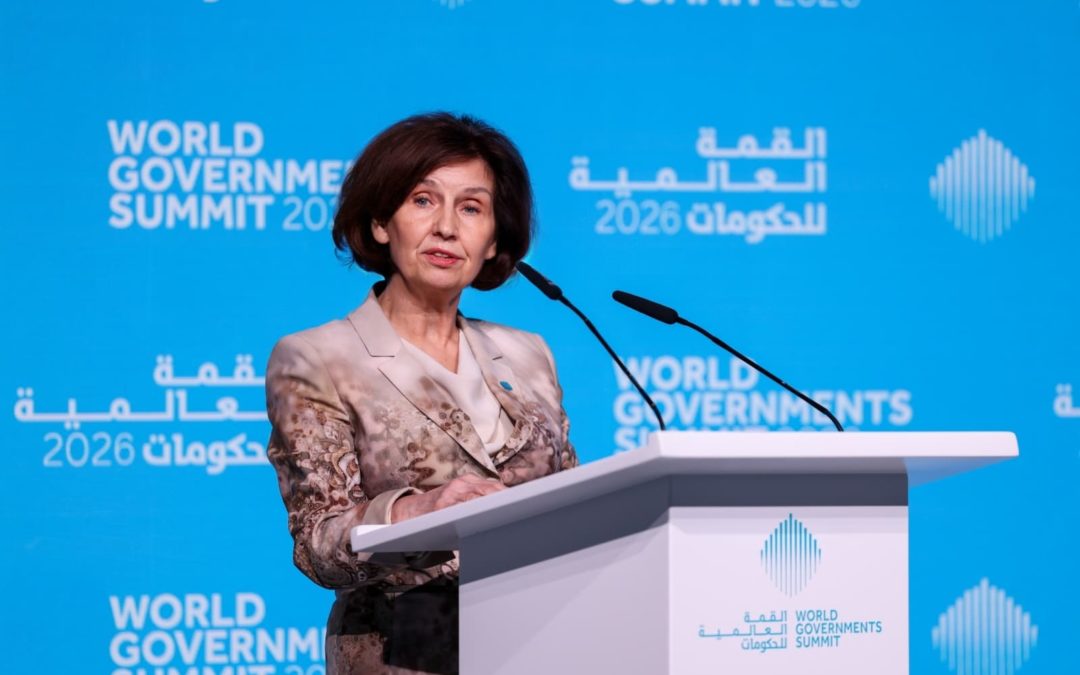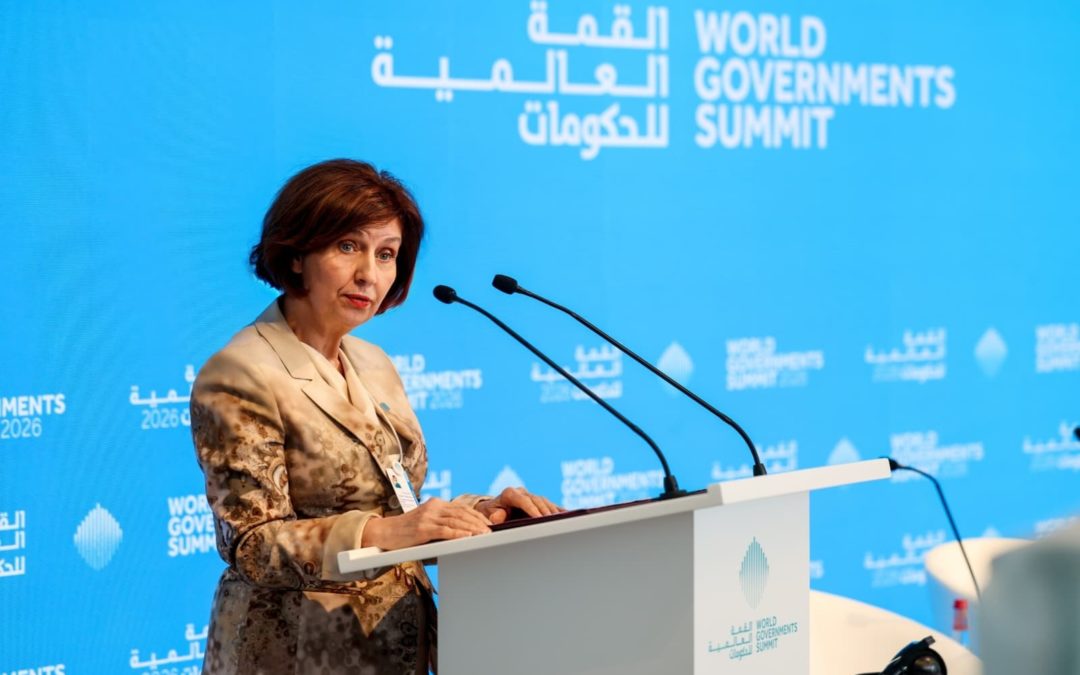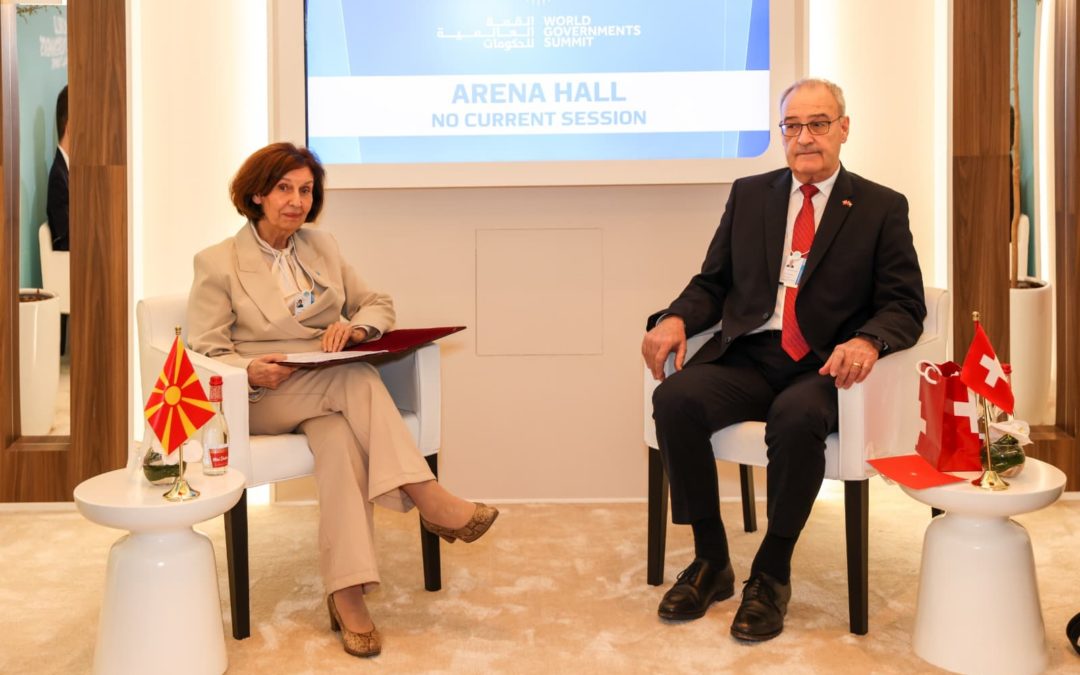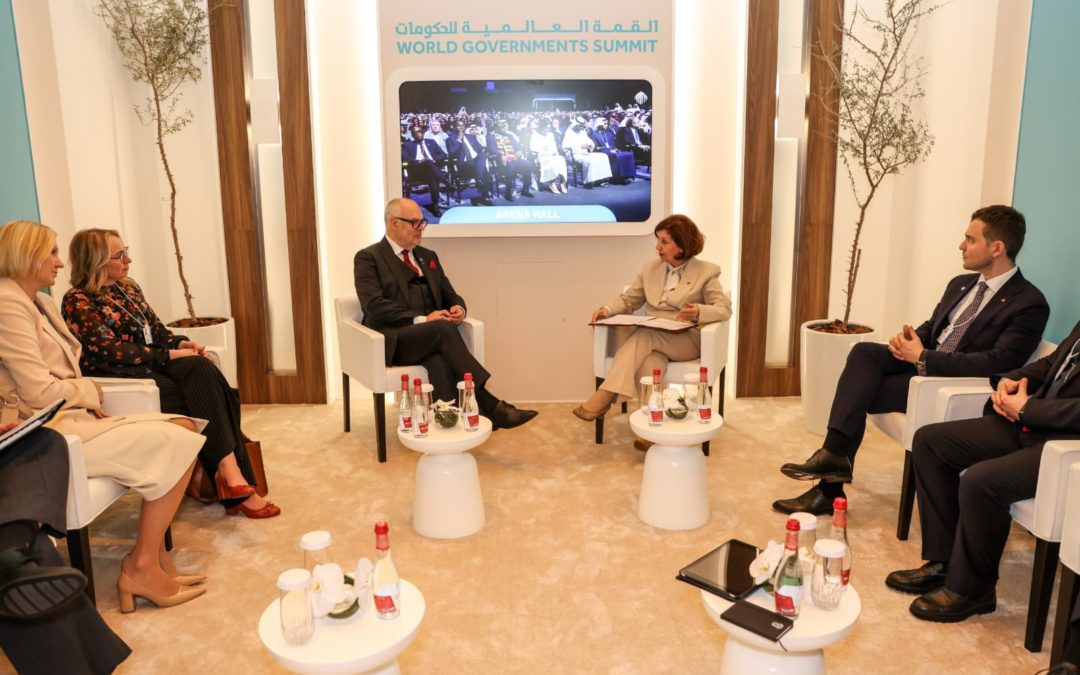President Gordana Siljanovska-Davkova addressed the traditional annual reception for representatives of the diplomatic corps, which she hosted yesterday evening in Skopje.
In her address at the reception, President Siljanovska-Davkova wished them personally and their loved ones, their states and nations, the EU and the European citizens, all the best in 2025. She emphasized that it is they, the diplomats, who personify the meaning and power of traditional diplomacy as a civilizational mechanism that has existed for centuries, managing to unite, build alliances and friendships, and forge peace.
“Personally, I believe not only in traditional diplomacy, but also in cultural, economic, and sports diplomacy. Personally, I do not understand diplomacy as “take it or leave it,” but as the art of the possible, and even the impossible. Personally, I prefer green tables to green military uniforms. Personally, I prefer the battle with arguments to the battle with weapons. Personally, I believe in the idea of European unification as a philosophy of peace”, the President said.
The Dean of the diplomatic corps, the Slovak Ambassador Henrik Markus, in his address at the reception, wished the present good health, prosperity and success in their professional and personal lives.
He placed good health in the first place as invaluable and necessary for the fulfillment of all other desires.
Ambassador Markus paid tribute to President Siljanovska Davkova for her extraordinary efforts in supporting initiatives to help oncology patients and other vulnerable groups and asked for applause in recognition.
He said that our country does not need investment – branding is imposed on its own because it can proudly be known as “the friendliest country in the world”, which radiates with its hospitality, excellent wine and warm-hearted people.
In that regard, the Ambassador wished that our country would convey this in all spheres of activity with its international partners, friends and allies, especially in the development of economic ties and business relations with them.
Below is the integral text of President Siljanovska-Davkova’s address.
Honourable Minister of Foreign Affairs and Foreign Trade, Timcho Mucunski,
Distinguished Ambassador Henrik Markus, Dean of the Diplomatic Corps,
Your Excellencies,
Ladies and gentlemen, dear friends,
Today’s gathering is an extraordinary opportunity to wish you all the best in 2025 — to you personally, your loved ones, your countries and nations, the EU, and all European citizens. You personify the importance and power of diplomacy as an indispensable civilizational mechanism that has endured through the centuries, uniting, forging alliances, building friendships, and creating peace. Personally, I believe not only in traditional diplomacy but also in cultural, economic, and sports diplomacy. For me, diplomacy is not “take it or leave it” but the art of the possible — and sometimes even the impossible. I prefer negotiating tables over military uniforms and argument-based battles over those with weapons. I hold the idea of European unification as a philosophy of peace.
As a state and an equal successor of the Federal Yugoslavia, we have already marked 30 years since establishing diplomatic relations with your countries and international organizations. While this may not be an exceedingly long period, it is sufficient to draw relevant conclusions and significant lessons, evaluate and assess ourselves, learn a great deal, and reflect on relationships and experiences. It is also an opportunity to project future relations and activities.
I am grateful to all ambassadors I have met for their fair relations and diplomatic and human understanding of our challenges.
In such semi-formal occasions like this, where we have the opportunity to speak less diplomatically about diplomacy, fully aware of its significance and importance in these turbulent times, thoughts come to my mind from Hemingway’s A Farewell to Arms and For Whom the Bell Tolls, as I see images reminiscent of Picasso’s Guernica or Lorca’s verses: “My poetry is a game, my life is a game, but I am not a game.” This year marks eighty years since the founding of the United Nations, a guarantor of peace and the peaceful resolution of conflicts, yet war still rages. I wish for the ceasefire agreement between Israel and Hamas to evolve into a lasting peace agreement and for war not to repeat itself. I wish for Venus, rather than Mars, to govern the world. This applies to the entire Near and Middle East, as well as to Russia and Ukraine and to the African continent!
My thoughts turned to the fundamental reasons behind the formation of the European Community: peace between France and Germany and the vision of European architecture as a peace project. Yet, at this moment, European states—Russia and Ukraine—are at war. This immediately raises the question: Is the source still clear, or has something muddied it? I will quote one of the founding fathers of the European Community, Jacques Delors, who wisely and prophetically outlined the contours of Europe’s future. Yes, dear colleagues, the wise are also visionaries; they think of the better things that are yet to come, and we are part of that vision. We have a duty to revisit the messages of Europe’s founding fathers. He said: “It is up to us to put flesh on the bones of the Community and, if I may dare suggest, to give it a little more soul.” “Europe’s diversity makes it incredibly rich. This diversity must be preserved so that it can bear fruit for the common good.” For me, the soul represents the principles and values of the EU, the philosophy of the EU, the metaphysics of the EU, clearly expressed in the Preamble of the Treaty on the European Union, the Preamble of the Lisbon Treaty, and the Charter of Fundamental Rights!
For the EU to be an inspiring democratic political system, or as Simon Hix describes it, an “unidentified political entity,” it must persuade more and command less on the path of political unification with states that are its natural members — geographically, historically, and culturally.
In the 21st century, with the existence of the United Nations, the International Court of Justice, the International Criminal Court, the Council of Europe, the Court in Strasbourg, the European Union, and the Court in Luxembourg, it is sheer hypocrisy to continue operating under the formula: the strong do what they can, and the weak suffer what they must.
The EU lacked a strategy for the Western Balkans, a category that emerged in the late 1990s as a peculiar geostrategic construct: the countries of the former Yugoslavia, minus Slovenia, plus Albania, then minus Croatia, plus Kosovo—a shifting geography for Europe’s periphery.
It appears the lesson from the bloody dissolution of Yugoslavia has not been learned when the EU lagged behind while the US was the first to arrive.
As a country, as a Macedonian nation, we identify with those monumental words of Delors, heavy as stone. Without any narcissism or exaggeration, we see ourselves as the soul striving to be united with the bones of the Union. That is what we desire; it is our strategic goal, which we have fought tirelessly for over 30 years.
The European Convention on Fundamental Rights, equal in importance and authority to the Lisbon Treaty, a document of constitutional character, states in its Preamble that the EU will respect the diverse cultures and traditions of the European peoples and their national identities.
These are precisely our fundamental principles, and as President of the Republic, I am committed to their respect. We are either equal, or we are not.
I have often quoted statements about Europe as an unfinished symphony, and I would like to say, in the spirit of music, that this “Four Seasons” reminds me of Vivaldi. Music is something that resonates deeply with us as a nation, and diplomacy can also carry an Orphic essence within it. Macedonian music, our melodic heritage, is marked by the unique seven-eighth rhythm, but it is also represented by the gaida—now protected by UNESCO as a part of the world’s cultural heritage. This instrument was not created yesterday; it has deep roots in our historical legacy. This is what we can offer, and what we do offer. It is our spiritual vertical in European and global diplomacy.
Though we are a small country, we want to be recognized for our uniqueness. And this, indeed, is something new we bring forward as a contribution to diplomatic negotiations: finding compromises, respecting the rhythm of diplomacy, which is not based on dictates or precedents but on equality, principles, and foundations.
Our songs are often melancholic, not by coincidence, and our dances are intricate. One of the most famous is called Teškoto—”The Difficult One.”
I wish that in 2025 we are enabled to move towards the European political home where, geographically, historically, and culturally, we have always belonged. If the Western Balkans is the “Achilles’ heel” for poetically inclined Western politicians, then they should ensure any weapon does not strike it. On behalf of all citizens, I wish that we embrace Europeanization on the wings of the Reform Agenda, shaped by the Copenhagen model! The Balkans is a natural part of Europe, and membership will serve as a powerful motivation for democratic changes in the region, permanently ending the threats of destabilisation and Balkanization. Diplomacy plays a particularly crucial role in identifying negative trends that pose a serious challenge to Europe as a zone of lasting peace, in the Kantian sense of the word.
Thus, EU membership has been and remains a paramount national interest and priority for Macedonia. Brussels is Macedonia’s strategic destination.
But if the right to life is the most fundamental human right, let us not forget: the Russian-Ukrainian war still rages on our continent, claiming countless human lives, causing destruction, and involving the use of supersonic weapons, drones, and artificial intelligence for military purposes. In the Middle East, similarly, a ceasefire between Israel and Hamas is on the horizon. The situation remains uncertain in Syria. From the very beginning of Russia’s military operation, we stood firmly on Ukraine’s side, not only because of Europe’s unified policy but on principle. And I ask—what has become of international law, international organizations, and international courts? How long will we continue to invoke Thucydides instead of Kant, I often wonder? Are you not diplomats inspired by Kant, rather than Machiavelli? Are you not the ultimate promoters and defenders of peace?
Of course, we must also think about our defense. Let me remind you of the words of a great German politician, Helmut Kohl, who stated: “Russia is Germany’s most important neighbour to the East, and it will remain so.” Does Putin think the same, I wonder?
Let us restore the United Nations’ role as a guarantor of global peace and order. Global challenges such as climate change, migration, historical revisionism, and anti-Semitism remain pressing issues. To reiterate what I stated in New York, profound reforms of the United Nations are essential, as the organization must not suffer the same fate as the League of Nations. The UN received a Nobel Peace Prize, yet wars continue to occur under its watch!
I wish you a proactive diplomatic tenure, a successful diplomatic year, and fruitful work founded on mutual respect and collaboration across all fields!
As for me, I have modest wishes: a decent, uneventful, dull European legal state with a democratic political system based on the separation of powers and adequate checks and balances; an independent judiciary grounded in the rule of law and committed to protecting human rights, enjoying the trust of citizens; respected minorities and protected vulnerable groups; a society of equal citizens; a healthy environment; a competitive market economy; a developed civil sector; strong and stable institutions; a meritocratic Weberian-type administration loyal to the Constitution and laws, not to party patrons; accountable governance; a Constitutional Court safeguarding constitutionality, legality, and fundamental human rights; objective and responsible media; quality education at all levels; incentivised science; respected culture; supported sports; a developed healthcare system; and a social state. In one sentence: Satisfied citizens.
Once again, may 2025 be your year—the New Year you have wished for, a year you will remember for GOOD!
